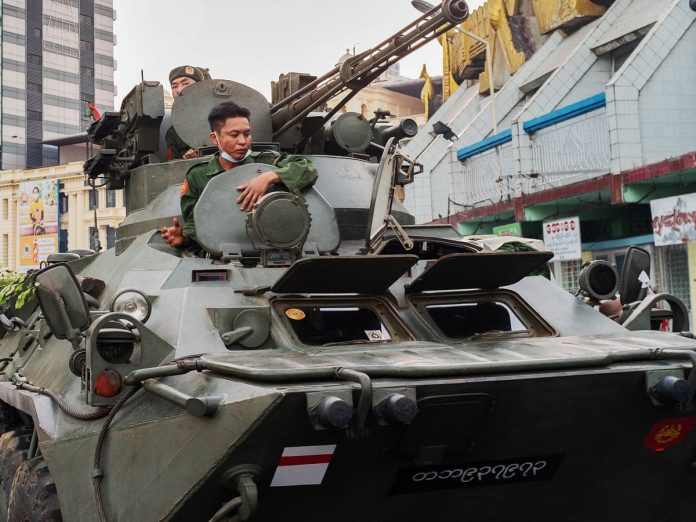Myanmar’s internet has been cut overnight on Sunday, hours after armoured vehicles rolled into several cities, prompting fears for the fate of protesters and warnings by diplomats that “the world is watching”.
Armoured cars appeared on the streets of Yangon, Myitkyina and Sittwe on Sunday, live footage broadcast online by local media showed, in the heaviest show of force so far by the military since it staged a coup on 1 February.
The US embassy in Myanmar warned on Sunday evening of reported “military movements” in the country’s main city, Yangon, and said it expected interruptions to internet access.
Around 1.30am, the internet-monitoring service Netblocks reported that national internet connectivity had fallen to 14% of ordinary levels. Contacts in Myanmar could not be reached by email or messaging apps.
The US embassy urged its citizens to “shelter in place” on Sunday evening local time after three armoured vehicles were sighted in the city for the first time since the military coup.
The embassy also said there was a “possibility of telecommunications interruptions overnight between 1am and 9am” (6.30pm to 2.30am GMT).
Unverified video footage and photographs posted on social media also appeared to show military trucks carrying troops on the streets of Yangon.
A group of ambassadors in Myanmar, including the envoys from the EU, US, UK and Canada, put out a statement on Sunday night voicing their concerns about the shutdown and a spate of arrests of activists, civil servants and political leaders over the past week.
“We call on security forces to refrain from violence against demonstrators and civilians, who are protesting the overthrow of their legitimate government,” the statement said.
“We support the people of Myanmar in their quest for democracy, freedom, peace and prosperity. The world is watching.”
The internet was blocked last Saturday as the protest movement was taking shape, but restored after 24 hours.
The demonstrators, mostly young people, have used the internet to organise, document their protests and capture the police response, including firing rubber bullets at crowds and, in some instances, the use of live ammunition.
Tens of thousands of protesters took to the streets of Myanmar’s largest cities for a ninth day of anti-coup demonstrations on Sunday.
The military rulers are also facing a strike by government workers, part of a civil disobedience campaign against the coup that deposed the civilian government led by Aung San Suu Kyi.
Soldiers were deployed to power plants in the northern state of Kachin, leading to a confrontation with demonstrators, some of whom said they believed the army intended to cut off the electricity.
The security forces fired to disperse protesters outside one plant in Kachin’s state capital Myitkyina, footage broadcast live on Facebook showed, although it was not clear if they were using rubber bullets or live rounds.
Two journalists from The 74 Media, which was broadcasting live from the site of the confrontation, were arrested along with three other journalists, the news outlet said in a Facebook post.
Many of the protesters nationwide held up images of Aung Sun Suu Kyi’s face. Her detention, on charges of importing walkie-talkies, is due to expire on Monday. Her lawyer, Khin Maung Zaw, could not be reached for comment.
More than 384 people have been detained since the coup, the monitoring group Assistance Association for Political Prisoners said, in a wave of mostly night-time arrests.
“While the international community is condemning the coup, Min Aung Hlaing is using every tool he has to instigate fears and instabilities,” activist Wai Hnin Pwint Thon from the UK-based rights group Burma Campaign UK said on Twitter, referring to the army chief.
Many protesters in Yangon carried signs calling for authorities to “stop kidnapping people at night”.
Source : Guardian
















